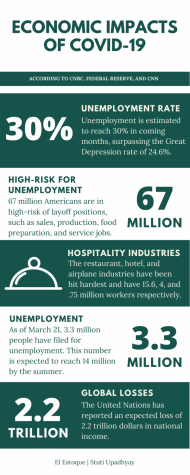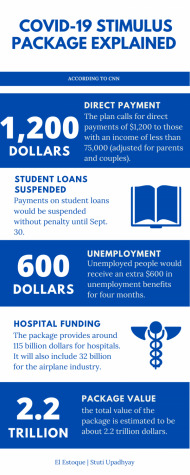Economic Impacts of COVID-19
World and local economies enter an unprecedented crisis caused by the COVID-19 pandemic
April 6, 2020
As the spread of COVID-19 sweeps the nation, thousands of businesses have been forced to close and global superpowers such as China and the U.S. are facing severe financial consequences.
According to Savita Sarathy, the Senior Director of IT Strategy at Western Digital and a retail currency trader with an M.B.A. in Finance, COVID-19 compares to the 1918 Spanish Flu, the deadliest pandemic to date, which claimed over 500 million lives worldwide and forced schools and business to close around the world. Satya explains that COVID-19 is believed to be just as detrimental, especially because countries are increasingly reliant on each other in the modern economy.
“The economic consequences of this pandemic will reverberate for years,” Sarathy said. “Primarily because the global economy today is far more connected than it was even a few decades ago. For example – China is responsible for a significant percentage of global manufacturing, both in the consumer and industrial sectors. With the Chinese economy essentially shutting down for weeks to stop the spread of the virus — global supply chains have been impacted, which have caused production delays in multiple industries.”
Senior Ted Chai, who’s extremely interested in finance, has been researching economic impacts of COVID-19, explains that this is the first time most high school students will experience such a turbulent economy. Chai explains that most high schoolers were too young to fully remember or understand the 2008 recession, and COVID-19 is shaping up to be even more financially detrimental.

“I would put it as financial Armageddon,” Chai said. “The way that things are shaping up right now, even if COVID-19 were to be completely eradicated tomorrow, we would be seeing the economic impact at least a year from now … Everybody’s pretty scared. I think it’s just important to say that this isn’t something that’s just isolated to Wall Street. Every single person that lives in the U.S. is going to feel it. Teachers are going to have their pensions cut, our parents are going to have to retire later. It’s going to be a lot harder for people that graduate college this year and next year to find a job.”
Sarathy claims that the COVID-19 situation is “rapidly evolving” as new information is constantly released through the press and government. As someone who trades currencies and stocks, Satya explains that it’s “best to stay on the sidelines” until the markets become less volatile, as the markets are currently moving unpredictably and with little direction.
“The one thing stock markets hate is uncertainty,” Sarathy said. “As the past few weeks have demonstrated, the markets have essentially wiped out most of the gains of the last year or two, as investors, driven by fear and panic, have stampeded out of riskier assets like stocks and made a beeline for safer assets like Treasury bonds. The markets have been swinging wildly – with records being set for largest percentage drops, and then wild gains as the markets absorb news bulletins promising support. But most of these gains haven’t lasted, and the reason for that is the underlying uncertainty.”
As of now, the stock market has made record drops, with the Dow Jones Industrial Average dropping around 28%, NASDAQ dropping 25.1% and the S&P 500 dropping around 24% since their respective peaks in mid-February. As Sarathy described, entire economies have been nearly shut down to try and contain the disease. While this is a necessary evil meant to prevent the spread of COVID-19, it has dramatic consequences for business all the way from Wall Street to local businesses in Cupertino.
Senior Sonia Singh, who works at a local Cupertino Starbucks, is one of the many people feeling the impact of COVID-19. Singh used to work two to three times a week, but her Starbucks location was closed indefinitely because of COVID-19. Singh explains that Starbucks has a catastrophe pay program, which means she is still paid for all the shifts she would have worked in the next few weeks. Despite this, Singh explains that her and her colleagues are still fairly uncertain about how the program will work in the long run.
“I know that a lot of people aren’t as fortunate,” Sing said. “I’m actually very thankful that I’m working with such a great company that has these policies in place. In terms of what’s going to happen after, because we only have a shift scheduled for the next two weeks, I have no idea what will happen. I don’t know if it will reopen or it’s if this catastrophe is still going. I have really no clue.”
Singh is also grateful that she is working at Starbucks solely for extra income, not to help support herself or her family. Although the closure does not impact their family’s financial situation greatly, she is concerned about others who rely on this income in the long-term and can no longer work.
Chai agrees with Singh, explaining that the closure of businesses is going to impact some people much more severely than others.
“In any crisis, we’re definitely positioned as the upper middle class much better than anybody with a lower economic status,” Chai said. “We can afford to hoard up on food on toilet paper and make investment moves as we see fit. As per just what our priorities are, if you’re someone who’s relying on a service job, and that service job is now paused for a while … if this is something that’s exacerbated, that lack of income is going to have a much greater hit on someone who is going paycheck to paycheck, and is now unable to pay rents, unable to pay back the debt that they have put on their car loans [and] the risk of not being able to go to a grocery store and buy food.”
Singh explains that Starbucks recognizes that this is a tough time for many workers, and their barista community tries to help each other out whenever possible. For example, Singh and several other baristas have been giving up their shifts to people who rely on Starbucks as their main source of income.
“I think the community [at Starbucks] is really nice,” Singh said. “People giving up shifts to make sure that everybody who needs the money or who needs a chance to work can get that chance. It just goes to show that regardless of what’s happening, people will still like to look out for each other in more ways than one can think.”

In order to support one another during these trying times, Chai encourages fellow students to understand COVID-19 and its economic impacts. He explains that there is a “vast wealth of resources out there,” such as the Fed, CNBC or Bloomberg.
“My defense mechanism for this crisis is just to learn as much as I can about it,” Chai said. “So I’ve been researching things like the Spanish flu of 1918, the indicators of recessions for the past hundred years, and every additional factoid that I come across is just slightly more terrifying than the previous one … I’ve always just wanted to understand things so I can adapt to them.”
AP Economics teacher Scott Victorine believes that this pandemic is good practice for students to familiarize themselves with how to read and analyze the news, as well as how to sort through and identify reliable information. He encourages students to read not only the main news headlines, but also to spend a few minutes on financial news so they can better understand how COVID-19 will impact them.
As an economics teacher, he is also able to apply some of the concepts he teaches to his students to COVID-19, such as the supply and demand behind hoarding toilet paper and hand sanitizer or the inflation caused by price gouging online.
“It’s unfortunate what’s happening,” Victorine said. “We’ve had to make certain changes and adjustments to not only our learning, but also our lifestyle, but there are things we can learn from this. In terms of teaching economics, there’s a lot of stuff that’s happening now is really relevant to what we’ve learned in economics. So again, supply and demand, trade — basic economic concepts.”
Sarathy explains that there are certain basic guidelines that become especially important during this pandemic — evaluating spending to make wise choices, building emergency funds to absorb unexpected expenses and using credit wisely (avoiding high-interest debt). She advises young adults to internalize these “basic financial rules” as they start their adult lives. And like Chai and Victorine, she encourages students to get educated.
“It is important for students to understand that they are literally watching history being made when it comes to this pandemic,” Sarathy said. “This is not the time to panic or react, but to educate oneself as much as possible. A major, global event like COVID-19 doesn’t just impact world economies, it also impacts our day to day financial lives. It can impact stock portfolios, college loan decisions, and so much more. The more informed we are, the better choices we make — regardless of age.”
Victorine also reminds students that although what they learn may be scary, the business cycle will eventually bring the market to a steady place. Victorine explains that the government is already looking for ways to help citizens, including a 2.2 trillion stimulus package. While certain detriments of COVID-19 are unavoidable, he encourages students to follow CDC guidelines and do their part to help.
“What we really need to do is … [slow] down the spread to where it’s manageable and we can work with it,” Victorine said. “That starts with all of us, it’s unfortunate that our lifestyles have to change, but it’s a necessary evil in the time being. I think the sooner we can get that into control, that’s when we’ll start to see [the market] get back on track and the economy starts to rebound. I don’t think realistically, we’re going to get out of this untouched. Obviously there’s human lives involved, but in terms of the economy, it’s gonna take quite a while to rebound from the damage that has already been done. I wouldn’t be surprised if there’s an imminent recession on the horizon.”



























